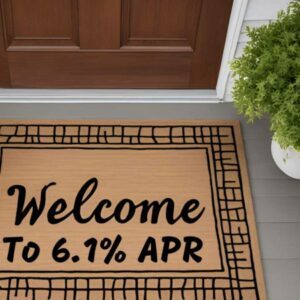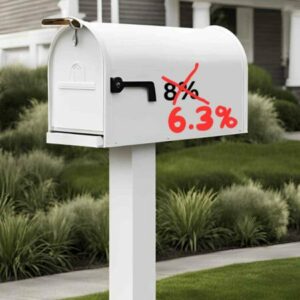 Last week, it looked like a home-buying stampede had finally been unleashed as borrowers rushed to take out loans after the recent drop in mortgage rates. Or so it seemed, since home loan applications reached their highest level since January. However, this is not what was actually occurring. This uptick in loan applications was primarily due to a rush to refinance by current homeowners, and was not due to a surge in home-buying activity.
Last week, it looked like a home-buying stampede had finally been unleashed as borrowers rushed to take out loans after the recent drop in mortgage rates. Or so it seemed, since home loan applications reached their highest level since January. However, this is not what was actually occurring. This uptick in loan applications was primarily due to a rush to refinance by current homeowners, and was not due to a surge in home-buying activity.
The Fannie Mae Refinance Application-Level Index (RALI) showed that the dollar-volume of refinance applications went up 32% for the week ending August 9th versus the previous week. Compared to the same week last year, refinance applications were up a massive 94.4%.
So, it looks like the refinance party bus is rapidly leaving the station, and I know you’re wondering if you should hop on. Here’s my best advice; if your loan’s interest rate is 7% or 8% right now, and you can refinance for just above 6% or less, then now looks like a really good time to do so. The traditional wisdom is that if you can cut your interest rate by at least 1/2 to 3/4 of a percentage point, then refinancing starts to be a good idea. Since refinancing fees typically cost between 2% to 6% of the amount of the new loan amount according to Freddie Mac, it doesn’t usually make sense to refinance if you’re not cutting your mortgage rate by at least half a percent. It will take a long time for the upfront investment in a refinance to pay off if you only cut your interest rate by 1/4%.
Fannie Mae has an excellent choose-your-own-adventure refinance calculator that I highly recommend for a personalized refi estimate.
Note that this Fannie Mae calculator doesn’t include some of the more bespoke ways to refinance; some lenders will do a delightful-sounding no-closing-cost refinance, which of course means that the closing costs are rolled into the loan rather than paid at closing. Thus, you do pay closing costs, but not upfront, and you also pay interest on those closing costs. That said, this can still save you significant money depending on how much it cuts your interest rate.
If you have an adjustable-rate mortgage that’s set to adjust soon, then it might be good to catch a ride on the refinance train before it leaves the station. Though inflation finally slowed to under 3%, this is a very recent development. In my completely unprofessional opinion, we’re not going to suddenly drop to a 4% interest rate just because inflation has been reasonable for the last two seconds. Thus, it might be good to “buy the dip” in interest rates in case it disappears soon.
It is crucial to note that, mysteriously, lower interest rates have not caused a surge in mortgage purchase applications, according to the Mortgage Bankers Association. You’d think that cheaper mortgages would have unleashed pent-up buyer demand, but this has not occurred. This may be because housing prices have not declined noticeably, according to HousingWire. It’s only refinances that have surged, but buyer demand has been relatively neutral, which has analysts somewhat confused. Mike Simenson at HousingWire says “We haven’t seen any pickup in demand over the last couple of weeks as mortgage rates fell under 7%. This is a bit surprising to me.”
Though statistics, facts, and figures are helpful, it’s difficult to tell the whole story without human psychology. If I had to take a guess, I would say that buyers are more focused on the list price of a home as a motivating factor, since it’s the first number they see when looking at properties. Current homeowners, on the other hand, already know what price they’ve paid, and it’s the current interest rate that has the most immediate effect on the price they’re already paying per month. That said, I just made up this explanation on the spot, and I’m sure it doesn’t tell the whole story. If you want me to make up other superficially plausible explanations like this one, let me know in the comments!
To conclude, if your loan’s interest rate is below 6.5%, I’m not sure that this is the best time to refinance. But if you’re paying over 7% and, based on your credit, you think you could get a 5.9% interest rate, I absolutely think you should take a spin on the Fannie Mae mortgage calculator and see where it takes you.
https://www.cnn.com/cnn-underscored/money/how-much-does-it-cost-to-refinance-a-mortgage
https://www.housingwire.com/articles/mortgage-rates-are-down-do-buyers-care/
https://abcnews.go.com/Business/wireStory/mortgage-refi-lower-rates-factor-refinancing-home-loan-112706531
https://www.realestatenews.com/2024/08/08/mortgage-rates-tumble-but-where-are-the-buyers
https://www.pressherald.com/2024/08/08/homeowners-race-to-refinance-as-mortgage-rates-retreat-from-23-year-highs/
https://www.fanniemae.com/research-and-insights/surveys-indices/refinance-application-level-index
https://www.scotsmanguide.com/news/latest-optimal-blue-data-offers-more-evidence-of-refi-rally/
(866) 519-9597



